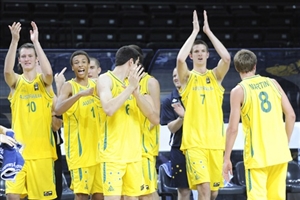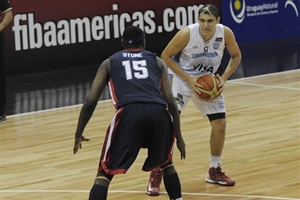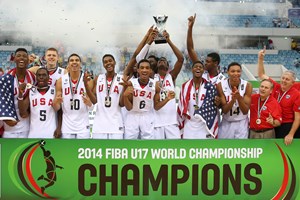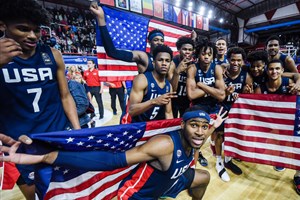
JPN - Japan's future relies heavily on Hachimura
TOKYO (FIBA U17 World Championship) - Japan can only claim to have qualified for one senior men's world tournament in the last 38 years. Enter Rui 'Louis' Hachimura, who coincidentally was born in the year of that lone appearance - with Japan placing 14th of 16 teams at the 1998 FIBA World Championship in Athens, Greece.
Hachimura may only be 16 years old, but he is the biggest hope for Japan, whose last showing on the world stage came at the 2006 FIBA World Championship which the country hosted. And the Toyama native will be the nation's main leader at the 2014 FIBA U17 World Championship.
"Louis is probably one of the only prospects we have in Japan right now," said Torsten Loibl, the sports director and associate head coach for Japan's men's national teams.
"He has everything that a basketball player needs. He's athletic, he has size, he is smart, has a high basketball IQ and is a hard-working kid."
Hachimura was Japan's leading scorer (22.8 points), rebounder (12.6 rebounds) and shot blocker (2.8 blocks) while also averaging 1.3 steals as Japan finished third place at the 2013 FIBA Asia U16 Championship to secure a spot in this summer's U17 Worlds taking place in Dubai, United Arab Emirates (UAE) (8-16 August).
"Louis' major problem is he doesn't get much competition in Japan. In Japan, he's a superstar and is dominating. So it would be good for him to go to Europe and play at a tough competition level," said Loibl, a German who used to coach in the second division in German and the Japanese Superleague and JBL.
"He's awesome at taking instruction. These kinds of kids are getting lost. And that's why I think he can be a big prospect. You don't find these kids very often - who work so hard, follow instruction, almost to a fault. He's very Japanese and follows instruction 100 percent. But he's such a positive kid. It's hard to find that talent and that unique character. That's what makes him special."
Still, as is often the case for Japanese youth teams, whenever a player has good size, they usually land in the post. But everyone in Japan - including Hachimura himself - is clear that the 2.00m talent must, in the long term, play on the wing to have an impact internationally.
"He's a typical slasher. He's a three-and-a-half (small forward/power forward). Hopefully we can transform him into a two-and-a-half (shooting guard/small forward) if he can shoot well enough. That's his future position. If he wants to have a chance internationally, he's got to be a two or three," said Loibl.
"Our men's generation is lost. We need to build a new generation and he's definitely part of it."
Hachimura himself said he would like to eventually move out of the low blocks, adding: "I want to play more three. But I have to learn to shoot better and penetrate more."
The youngster was able to test himself at the recent Albert Schweitzer Tournament (AST) in Germany, along with four other players who are expected to be included in Japan's team for the FIBA U17 World Championship.
"We don't have many tall players in Japan so I wanted to play against tall players and learn how to play against them," said Hachimura, who was two years younger than most of the players but still averaged 13.5 points, 5.3 rebounds and 1.2 assists.
"I'm not good enough to play here, honestly. But I like the challenge. The biggest challenge was not losing any confidence and remaining mentally strong."
Japan went winless (0-6) and finished last in 16th place at the tournament in Mannheim, but Hachimura expects better things in Dubai, where Japan are drawn into Group B with France, Canada and Australia.
"Mainly, we don't want to lose. We want to win games. Of course our biggest goal is to reach the top three," said Hachimura, whose country will be making their debut at the U17 Worlds.
When asked what the team needs to do well to win games, he said: "We need to play really well in transition."
The transition of Hachimura will also be a key over the long haul for Japan.
FIBA


















